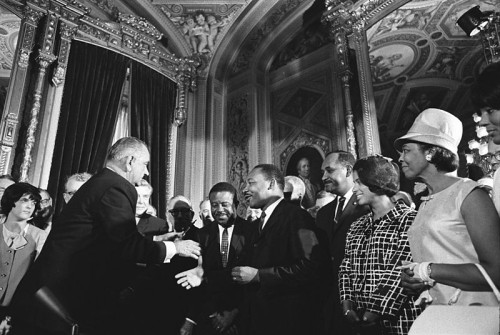Today, July 4th, is Independence Day in the United States, the nationally celebrated mark of freedom in this country from the Kingdom of Great Britain. On this day in 1776, the Declaration of Independence was adopted and we begun a history of celebration of freedom, an ideal of freedom. Recent Supreme Court rulings bring many questions to the forefront about that ideal of freedom, and the idea that the United States has a history of writing social policy that does not actually equate to freedom for the ethnic minorities within this country. Slavery was still a legal institution here while we simultaneously adopted the declaration and celebrated freedom for Americans. Since the Declaration of Independence, and other such policies, did not give freedoms and rights to African Americans, what social and government policies did? And how important are those today?

Johnson and Civil rights leaders for Voter’s Rights Act.
On June 25th, 2013, the Supreme Court made a landmark, and unexpected, decision to dismantle Section 4 of the Voting Rights Act (VRA) that was signed into law on August 6th, 1965. President Johnson signed the Voters Rights Act into law in the presence of prominent civil rights leaders such as Martin Luther King Jr. and Rosa Parks; it was a historic moment for the civil rights movement and for the movement of equality within this country.
Section 4 of the VRA identified those states and counties that would receive the oversight of Section 5, restricting any changes to qualifications or prerequisites for voters in their coverage area without the approval from the Federal Government. Why? Post Emancipation Proclamation, Jim Crow laws and racism in this country continued to become systematic, affecting African Americans’ access to their citizen-given voting rights. Common tactics employed to restrict categories of voters included everything from literacy tests, to voting poll taxes, to classic voter intimidation, to even death. Civil rights leaders fought to make sure that African Americans had the same access to their voting rights as others in this country.
Then, on June 25th, the Supreme Court removed this section of the VRA, citing it as unconstitutional, referencing that problems of racism or prejudice were no longer prevalent in today’s society. Within 48 hours of this ruling, numerous states that were restricted under Section 4 of the VRA moved to make changes to their voting requirements, redistricting and other modifications that would have formally required approvals, some of which were already denied. It is important to note that the areas that were still covered under this section of the VRA were not previously able to prove 10 years of fair voting practices within their state or area, and other areas had already been removed from the VRA when they had petitioned and proven fair practices.
After the changes in the Voter’s Rights Act, the following day the repeal of DOMA and ruling on Proposition 8 overshadowed the SCOTUS ruling and little discussion has been generated in greater society, and especially within the Pagan community.
And so why is this important to Pagans?
In order to answer this question for Pagans at large, we should consider the varying reasons that equality, access to fair treatment under the law, and the intersectionality of privilege plays a role in the perception of liberty. As Pagans, we can often relate to the challenging and temperamental balance of rights within United States society, even with freedom of religion as one of our constitutional rights. How often do we have to fight for our freedom of belief as minorities in faith practice? Within the last few days, several Pagans have commented on their belief of the importance of this in society, and within Paganism.
Lydia M. Crabtree
“As a Pagan the mixed messages of the Supreme Court this week has left my heart heavy and shaken my belief in the country and laws that I love and respect. With state’s rights the battle cry, this war is likely to be as emotionally scarring and traumatizing as the Civil War. This New Civil War is one that is utilizing cold war tactics to pit us against each other. Even as the courts proclaim we are equal in the law it is simultaneously saying individual states have the right to restrict and disenfranchise people based on their opinion, color, and sexual orientation. It has created a world where living in one state over another will mean different freedoms for different people. So many seem to be cheering around me without completely understanding the full weight of the coming fights ahead. The Supreme Court itself has tried to deflect responsibility to the state level only to guarantee that these fights will reappear before them. It isn’t just voting and marriage I worry about. It is the right to have a body without government imposed restrictions. It is the right to worship without fear of losing a job, house or state benefits. It is the right to have a congressional and state governing body that accurately reflects the opinions and will of the people regardless of how varied they are.
In this New Civil War it is crucial that we win the fight of exposing “state’s rights” as a euphemism for “power to the powerful” or “right to restrict individuals in the name of sovereign government.” The principle of our country was not that individual states have rights superseding the rights of individuals. The Declaration of Independence said “We the people…” have rights and no authority can willfully, maliciously and methodically destroy the rights of us, the people. Not England. Not the United States Government. Not an individual state or city.
These are real issues and it seems to me that now more than every minority persons should stand together. This is why being closeted in any minority matter is dangerous. If we are quiet, uneducated and unmoved by the trials and tribulations of other minorities then we are easily picked off.” – Lydia M. Crabtree – Pagan author.
Rhiannon Theurer
“I don’t know that I have anything particularly deep to say as a Pagan, but I will say that as someone who believes we are all expressions of the Divine I am saddened and angered by the decisions of the Supreme Court that reinforce inequity and hierarchy. The decisions this week attacking Native sovereignty and the VRA show us yet again how some voices are privileged over others, and that these are structural problems that require us all to speak up for equality and justice. In addition, these decisions are an important reminder for the Pagan community that as minorities we can never take legal rights for granted. I hope that all Pagans can stand together with all the people directly affected by these rulings, both within and without the Pagan community, and continue to work for justice and the liberation of all beings.” – Rhiannon Theurer – Pagan, Therapist.
T. Thorn Coyle
“The Voting Rights Act offers a chance of full participation in government. Its passage ensured that states with a history of voter suppression could not change voting laws without checking with the federal government. The VRA is an attempt at establishing equity.
This article by Paul Shepard states: “with 13,000 separate voting districts around the country, there are 13,000 different ways that elections are conducted, opening the doors to discriminatory practices to disenfranchise minority voters.” Disenfranchisement in the US is real and present. If a high percentage of poor people don’t have IDs and my state decides to pass a Voter ID act, then poor people have less of a chance of true representation. The power of their voice decreases. If district elections help Latinos get governmental representation, then district elections support the process of equitable government.
“One person, one vote” is a good policy, but is not sufficient to build systems that foster fair treatment, health, and happiness for all. As long as we are living within cascading systems of racism, sexism, ableism, homophobia, transphobia, and religious intolerance, we are hard pressed to build an equitable society. Systemic racism is a consistent force of disenfranchisement. So is classism, which often goes hand in hand with racism. This racism isn’t the ugly face of the screaming bigot, but rather is embedded in the interlocking systems that uphold the status quo.” – T. Thorn Coyle – Activist, Pagan author,
Seba O’Kiley
“Assuming that there is no longer any need for Section Four (and by proxy Section Five) of the VRA (specifically for the Deep South) is like throwing a tarp over invasive weeds for a while then assuming that, simply because the plant rots over the surface, there is no longer a live root. The question is not why keep what 1965 America sought to put into place, but why disarm those defensive measures against such an invasive, deeply-rooted monster. As pagans, we are under the awesome responsibility of caring for our Universe, being the watchdogs for inequities and calling out injustices. We are not called to “look away,” but to shine light into dark places–even if those places are our own hearts. As a life-long Alabamian and a pagan, I know and love my home all too well to assume that it no longer needs such a light. As a former Housing Authority Councilwoman, I have seen redistricting along racial lines as they pertain to our city schools in only the last ten years. Leaving racial justice in the hands of the state without some parameters, checks and balances is naive disconcern at best–veiled racism, at worst. Neither are acceptable for a pagan sensibility of interconnected beings.” – Seba O’Kiley, Beloved Woman/Priestess, Gangani Tribe of Alabama.
Erick DuPree
“To me this ruling is first about privilege, and through the lens of privilege SCOTUS’ VRA verdict breaks down the fabric of democracy. I feel as Pagans we lift up the right to self determination as a sacred rite, one where we hold our self accountable first. As Pagans we give privilege a name, and the actively choose to disengage, and break down the walls of oppression, destruction that living within privilege bring. The ruling has potentially taken that right (and rite) away from millions of US citizens.” – Erick DuPree, Dharma Pagan and blogger.
“I’d love to contribute if I can; right now my head is swirling with conflicting mix – relieved & delighted that my marriage wasn’t taken away by the state, dismayed at gutting the VRA, paranoid that dismantling oversight on elections opens the door to all sorts of voting fraud along not only racist lines but anti- immigrant, anti-women, anti-what calls itself Christian in politics lines. They’re all tied together – white privilege is what allows most Pagans to assume their differences will be accepted, but as a white bisexual who passes as straight, i know that’s not true – my marriage has been in limbo, held hostage for 5 years. What-calls-itself-Christian-in-politics is deeply, inherently racist & anti- sexual freedom; I fully expect neo pagans to be openly targeted next.” – Lise M. Dyckman
And in later dialog:
“Many, if not most, US neo pagans accept as tenets certain ideas that are hotly contested in the political arena. Responsibility for the health of our planet, allowing value to non- human life forms, honoring the female divine, & sexual self-determination are woven into a lot of neopagan belief. They’re also frequently contested by lawmakers, policy makers, regulation enforcers. If our beliefs are explained away as merely left-wing attitudes, we’re at risk of losing the ability to practice our religion (just ask First Nations / Native American folks how quick & easy that can be).
But we mostly-white, mostly-middle class, mostly-educated neo pagans don’t really think that could happen to us. And we’re wrong. That’s why gutting the Voting Rights Act matters to even privileged, comfortable pagans. The Act was crafted with the intent to force proven racist communities to “play fair” in elections, and to take corrective measures when they had been caught at fraud. There isn’t anything else like it in the US, that has such teeth & such oversight powers. Without it, there’s no real mechanism to keep special interests from meddling in elections. And we all know how likely that is.
[Neo]paganism is one of the fastest growing religions in the US, according to a recent Pew Survey. Particularly among younger, educated, and generally left-leaning adults. You can bet those special interests are looking at us, and at how we vote. And they’re lumping us together with Blacks, women, & immigrants as voters-to-be-suppressed. I fully expect to see more attacks on the voting rights of all these groups in the near future – and without a mechanism like the VRA to ensure franchisement, we’re gonna be silenced. This isn’t (just) paranoia; the voting record of districts under VRA corrective oversight is consistently more liberal than comparable districts without it. Wendy Davis’ district in Fort Worth , for example.” – Lise Dykeman
Peter Dybing
“The Supreme Court has gutted the voting rights act. Taking the position that progress has been made the court essentially withdrew the very protections that have created the change they cited. My heart is heavy with thoughts of what this change will mean. Conservative legislators across the south are already engaged in manifesting laws that will cause the voices of minority Americans to be even further marginalized. For those, like myself, who are interested in freedom and justice for people of color it is a sad day in America.
These feelings are complicated by our communities urge to celebrate recent victories around LGBT rights; yet all of our civil rights are bound together in the fabric of social justice. The courts recent gutting of the VRA has begun the process of unraveling the very fabric we are celebrating having weaved new threads into.” – Peter Dybing – Activist, Pagan blogger.
Yeshe Rabbit
“The dismantling of VRA protections opens the way to great potential abuse of state and local power. It allows for further possible institutionalization of overt and subtle racism by authorities representing and protecting the highest-paying or most privileged voices in any given landscape. This may end up leaving many voiceless. It represents the very real threat that the picture of racial politics and racial justice in our nation might slip backwards into a state more closely resembling the Civil War era than any of us cares to envision.
Racism has its roots in an untrue, unfair, illusory, ill-informed story that caucasian people have been collectively, blatantly, and insidiously telling ourselves as a means to justify our cruelty to people of color for a very long time, despite ample evidence that the story is wrong. As Pagans and Polytheists, many of us understand the power of myth and story to shape reality. It is our responsibility to each question our own stories about race, to discuss them, to peel them apart and investigate them, to critique them heavily, and to help write new stories of equality, dignity, reparation/rectification, and access for all the distinct races as well as the many diverse combinations of races we see growing in our population. This has the possibility of being an amazing magical wave of change, a gift of collective growth from our community to the nation, if we each choose to take it up with a full heart and willingness to really learn and grow, to refine ourselves, to commit to improvements for ourselves and for our future descendants who will still be working on this issue for many generations.” – Yeshe Rabbit, CAYA High Priestess and blogger.
“If we do not defend the rights of others, there will be no one left to help us defend ours. It is one of the principles of our belonging to the “Pagan” label. Strength in numbers. But if we do not use that strength to fight for what is right, what is this community of “Paganism” for?” – Jelen VanderYacht, Pagan
In my personal beliefs as an African American practitioner of the Craft, I have been quite dismayed at the lack of attention that this subject has gotten from mainstream Paganism. Regardless of differing opinions on the method to ensure freedoms, the idea that reversal of the VRA has an impact on the African American sense of place is very important to consider. The very Eurocentric construct that exists within Paganism often leads to perceptions of reality that are based in theory that does not apply to all of today’s Pagan practitioners. The Pagan community often sees this when it comes to the rights of Pagans as a religion, the rights of other oppressed groups that are highly connected to our Pagan community, but not when it comes to those things that are related to race. It leads me to wonder whether the Pagan community is afraid of race relations, thereby creating a larger challenge to the idea that Pagansim indeed encompasses more than just the notion that race does not matter in our spirituality. For the Pagan of color, it indeed does.
Author, Lydia M. Crabtree, summed up this thought for me on her most recent blog post:
“So pagans fight for rights when they infringe upon our direct religious rights and when they directly infringe upon our strongly held spiritual beliefs (the Earth is sacred and should be protected).
Yet when presented with knowledge that an apartheid like atmosphere is being created in our own country, pagans are silent. This silence is in essence turning away from another principle of earth-centric religion. Thou art God. Thou art Goddess.
Our silence says, “Thou art God, if you are white or if your issues reflect a direct impact upon my spirituality.”
“Thou art Goddess, only if your problems directly infringe upon my religious freedom.”
And in this division, apartheid legislation will become a norm unchallenged. It is the classic deflection and deferral, “I am pagan and I am not black, so these laws will not affect me.” This line of thinking lacks a foresight and vision that I feel is another spiritual cornerstone of earth-centric spirituality: We are one.”
When we are considering the impact of any limitation of rights towards oppressed and minority groups, we should consider how the limiting of rights to one minority could encourage or connect to our own Pagan freedoms. When policies are created to protect the rights of an underprivileged or oppressed population, it is important to think about the varying levels of “freedom” that are or are not experienced by others. To assume that we are all entitled to the same liberties and freedoms under the law, is to assume that we as Pagans are due liberties that are not guaranteed either.
What freedom will you celebrate on this Fourth of July?
The Wild Hunt is not responsible for links to external content.
To join a conversation on this post:
Visit our The Wild Hunt subreddit! Point your favorite browser to https://www.reddit.com/r/The_Wild_Hunt_News/, then click “JOIN”. Make sure to click the bell, too, to be notified of new articles posted to our subreddit.







Pingback: My “Wild” Announcement and Upcoming Sage Woman Column. | CrystalBlanton.com
First they came for the communists,
and I didn’t speak out because I wasn’t a communist.
Then they came for the socialists,
and I didn’t speak out because I wasn’t a socialist.
Then they came for the trade unionists,
and I didn’t speak out because I wasn’t a trade unionist.
Then they came for the Jews,
and I didn’t speak out because I wasn’t a Jew.
Then they came for the Catholics,
and I didn’t speak out because I wasn’t a Catholic.
Then they came for me,
and there was no one left to speak for me.
Seemed topical.
Martin Luther King said it best: Injustice anywhere is a threat to justice everywhere.
At least as pernicious as the gutting of the VRA is the rampant gerrymandering that has been going on in states not covered by VRA, such as my own Ohio, where a state fairly evenly divided between Democrats and Republicans has a Congressional delegation strongly biased to the Republican side.
Yes, this would be a situation with a possibility for a postitive outcome- that other states receive the same heavy federal oversight- had we a functional congress.
Pingback: Pagan Radio Network Voters Rights Act, Independence Day, and the Pagan Response | Pagan Radio Network
Pingback: Disabled Writers Speak Out About Voters Rights | What do you see in the magic mirror?
if the supreme court has discriminated against any religion, then they themselves have broken the law of the usa. ref the first amendment in which it states that no law can be made to discriminate between any persons religious beliefs.
Irrelevant considering some of the decisions handed down by SCOTUS the last few years, or the fact that our 4th amendment rights only exist on paper at this point. Law doesn’t trip the power machine for long.
When it comes to the gutting of the VRA, I keep thinking of something Stephen Colbert said a while back (I don’t think it was about the VRA case, I think it was some other law that got overturned, but I could be wrong as I was only walking through the room at the time). He said getting rid of that law was like a man arguing that he doesn’t need a restraining order anymore because he hasn’t beaten his ex-girlfriend since she took the order out!
As a society, we have not progressed as far as this ruling likes to pretend, and the majority “Justices” (I’m using sarcastic quotes here, because they do not deserve that title) know godsdamn well that we haven’t. This ruling is an outrage.
Also, don’t confuse the blog-o-sphere with the Pagan community as a whole. I and all the Pagans I know have followed this closely and are pissed as hell. We just don’t blog (well, most of us don’t. A few blog about specialty stuff, like cooking and gardening, so this topic isn’t really relevant to that).
Raksha38, absolutely. I think that is a good point that many people might have some strong thoughts about this ruling and are not the bloggers of the Pagan world. I agree.
Pingback: Musica Pagani Celebrates Independence | Pagan-Musings Podcast Channel
I have to say that I’m a little confused by the sentiment you express at the end of this article, that there has been a lack of attention by Pagans on the Supreme Court’s VRA decision, especially when it is immediately preceded by you quoting a number of Pagans on just that subject. Where do you see this lack coming from? Everyone I know and have read has been very upset about this decision and are experiencing very conflicting emotions since it came in such close quarters to the DOMA/Prop 8 decisions which, while not being an overwhelming success, are still something to celebrate. I’m just curious to know where you’re coming from on this.
Jay, good question. I was able to get some fantastic quotes from some incredible Pagans on this matter. Yet there is a small number of people or organizations speaking out about this. Court cases like DOMA got a lot of attention over the years from an individual standpoint and from a Pagan organization standpoint. That has not been shown here with the VRA. While some of us are speaking out now, which is fantastic, many of us within the blogesphere community have notices the silence in comparison.
My question for the Pagan community is: “What are you going to do about it?” Voting and and being politically involved is certainly a good idea- However, many of us, as practitioners of Magick, can bring to bear certain spiritual pressures on the world in which we live. You can be certain that the Christians are throwing the weight of their prayers into the mix, and believe in their mythology or not, it has an effect- even as our own rites echo. How many of us are willing to throw our spiritual weight into the fight, to make our reality what we want it to be? Just something worth considering.
My question Arjil is what are you going to do about it? We each have to take a moment and reflect and determine what part of the whole we can do. I am not sure that as a magical community we can advance the issue to effect sweeping change in the immediate. But right now, we can harness the power with grassroots efforts in our voting and polling places and local government and use the best magic we have. It may not sound glamorous but if every practitioner of magic put a drop in the bucket of this cause our well would be quite full.
I agree with what (I think) Erick is saying, that besides bringing these concerns into our rituals, we have to bring them into our sacred everyday. This isn’t just a call to walk our talk / to practice our prayers on personal levels. It’s also a call to pay attention to what’s going on in a broader sphere than our day-to-day concerns, and to take action beyond just within our circles.